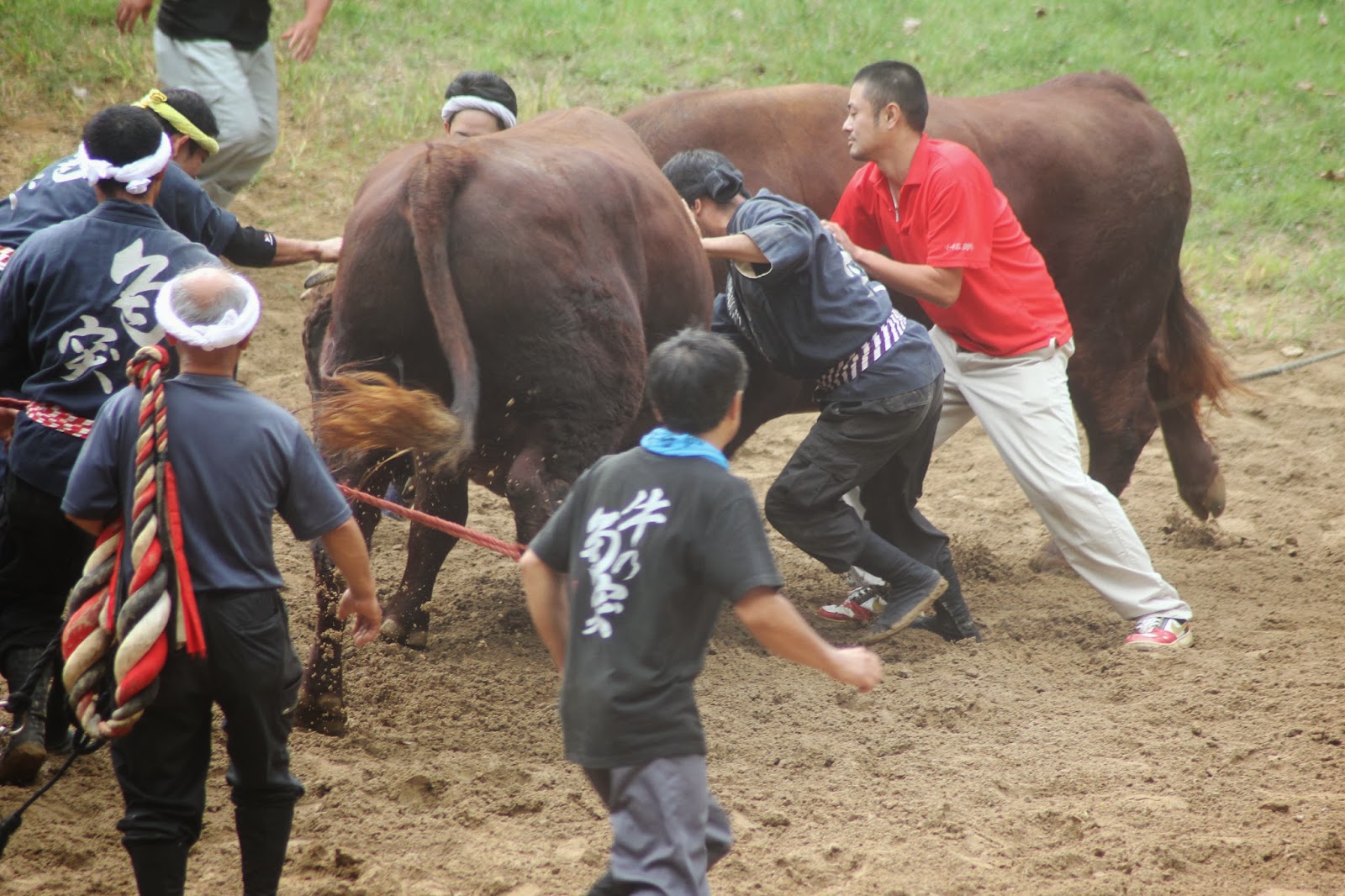Bull Sumo / Togyu 闘牛
Nestled in the pristine backwood of Koguriyama in Ojiya, there's a beautiful hilly area surrounded by thick green trees and Shinto Shrines. There's a god for everything in Japan, even bulls. The road up to the arena is on a steep, uneven and windy path. It's hard to believe they built a bull arena this deep in the sticks; making it the most inconvenient place you could possibly reach. I thought the taxi driver was lost! The air had a grassy manure smell mixed in with pine and beer! I loved it. On the way up, there was almost a deafening silence in my eardrum. I could finally distinguish the sounds of nature; bird, insects, the sounds of tree branches rustling in the breeze. It was nostalgic. Places like Ojiya are often associated with great poets like Junzaburo Nishiwaki, a four time Nobel Prize nominee, and a Person of Cultural Merit by the Japanese government. It's easy to see where he derived his source of inspiration earlier on in his life.
 |
| Arena |
 |
| The Bulls are led out from their stables |
 |
| The nooses are loosed |
 |
| Horns are locked and then they go at it |
Since the 17th Century bullfighting has existed in Japan. Bullfighting or bull sumo, as it's called euphemistically, is not the same as Spanish bullfighting where man is pitted up against a 2000 pound bull whose only intent is to kill or maim his opponent. In Japan,there is no blood spilt and neither is the bull executed after losing. Togyu is not as widely known a sport in Japan as it was centuries ago. Most native Japanese have never even heard of the sport until recently thanks to syndicated news organizations like NHK. The sport itself originated in Okinawa but eventually spread to Shimane, Iwate, and eventually Niigata. There are other places as well.
 |
| After loosing a match |
I chose Ojiya City in Niigata Prefecture, the motherlode of great sake, southern uonuma rice, and hegi-soba, to enjoy watching bull sumo. I could've easily went to Okinawa or Shimane, but for me, the idea of watching a bullfight in the rice capital of Japan was rather intriguing, since Niigata is also known for having delicious beef.
("Beef and rice together is worth more than life itself. Hot fatty beef over freshly steamed southern koshihikari rice is simply divine. ")
The final event of the year will be held in November, so check around for it. In bull sumo there are rankings for how well each bull performs, just like you would see in a real sumo tournament. There are also different weight classes so that each match is evenly balanced. There's even a bull yokozuna( grand champion) with its own tassels wrapped around its head. In the beginning of a match bulls are paraded around the arena in order to showcase their muscular bodies. Just like in human sumo, where each wrestler crouches down to intimidate his opponent by staring each other down, bulls also do a kind of ceremonial posturing. They let out a series of loud throaty moans. This exhibition of sound is exquisitely beautiful to watch and hear.
You can reach Urasa Station via the Max Toki shinkansen from Tokyo Station. Then transfer to the local line and continue to Ojiya Station. There is nothing in Ojiya but old shops. Also buses are highly infrequent. From the station to the arena is about 8.5 km. or a 3500 yen taxi ride. In my other post I will list up a couple of good places to eat around town.
All in all, the event was spectacular especially as the bulls became more aggressive near towards the end. It was also nice watching the trainers wrestle the bulls away from each other, and watching them get thrown around like rag dolls. The sheer power of these animals on display is worth coming this far up to watch. Really. I can't think of a better post-summer activity to enjoy.
This country never ceases to amaze me at how vast its cultural heritage is.. The Japanese have successfully merged so many natural and spiritual elements together so seamlessly; lest you had a keen eye you would hardly notice it. The bulls that fought today were friends, they weren't out to kill each other. You could sense that in the air. Just good sports(bull)ship.







Comments
Post a Comment